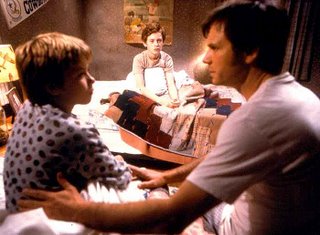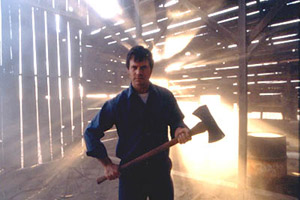
When I first saw Weird Science (1985), I was happy whenever I saw two actors on screen: First of all, I must confess, Kelly LeBrock, whom John Hughes photographed in such an iconic way that--like Betty Grable in the '40s stretching her legs out, just so, for all those G.I.s--she grew to represent the '80s ideal of the American Beauty--which oddly enough included a British accent. But the second welcome sight was Bill Paxton's Chet, Hughes' grinning-est teen nemesis, splay-footed in his skivvies, "gettin' off" on his own evil. At once manipulative and malleable, Chet drew me into the off-center middle-west knuckleheaded world Paxton would fool around with for a while: A year after Weird Science, he earned his own niche in the wall of movie immortality with his freaked-out Pvt. Hudson in Aliens; I can even remember downloading an early home-made video game in which, when you lost, you heard Hudson's famous exclamation as the inexorable aliens left them stranded and hemmed in: "It's game over, man, game over!" Good ol' boy Bill: a cigar-chomping bully until his bluff was called.
His first triumph along these lines is in Kathryn Bigelow's redneck vampire road movie, Near Dark (1987), in which Paxton gets to say things like, "We keep odd hours." It's a ruthless, smirking performance, full of dark fun and adolescent menace. And should be the focus of a Halloween Roundup. But I play 'em as they come, and last night I watched Frailty (2001) again--and by the way, Paxton's second career as a producer-director has been interesting; check out Traveller (1997), which he co-produced. And while that film does have a Southern Gothic feel around the edges, in Frailty the gothicism is, to put it mildly, head-on and up-front.
I'm afraid I won't be able to do too much here with the plot: This is the kind of movie I like to consider a "mule," if only because, once you get to the back end, it kicks. But in its tale of an amiable single Dad (Paxton) with two boys (Matthew O'Leary and Jeremy Sumpter; as an adult--we receive the story in flashback--one of them is played by Matthew McConaughey, another actor who makes good choices; go watch Thirteen Conversations About One Thing, released the same year as Frailty), all seems well until the father wakes up the boys one night to inform them that God's angel has spoken to him, and they must seek and destroy demons, who are of course disguised as (more or less) ordinary people. What follows is a frank discourse on Hell--if Hell is a place in which someone you depend on asks you to watch him become a monster, and demands you do the same. While surprisingly free of blood and gore, Frailty disturbs because of that demand.
 When I was a kid I remember being told by one of the nuns at my school that you had to follow the commandment to obey your parents--unless they told you to sin. I used to imagine my parents deciding to enter a life of crime--bank holdups, as I recall--and telling me I would have to go along. And while the thought of my mother and father, wearing masks and turtlenecks, startling the patrons with cries of "Stick 'em up!" made me uneasy--after all, they must've been lying to me all along if they had that in them--a part of me relished the thought of saying No, and having God on my side for once.
When I was a kid I remember being told by one of the nuns at my school that you had to follow the commandment to obey your parents--unless they told you to sin. I used to imagine my parents deciding to enter a life of crime--bank holdups, as I recall--and telling me I would have to go along. And while the thought of my mother and father, wearing masks and turtlenecks, startling the patrons with cries of "Stick 'em up!" made me uneasy--after all, they must've been lying to me all along if they had that in them--a part of me relished the thought of saying No, and having God on my side for once.Ahem. Frailty pretty effectively puts the kibosh on that strange little daydream. And I'm wrong to be joking about it, because the movie refuses to compromise its vision of Hell on Earth. As the older son digs a gigantic hole in their back yard (the future "dungeon" to hold the demons before death by lead pipe and ax)--part punishment, part prelude to his own scary version of fasting in the desert--I saw with Gothic clarity the terror of obedience and the nausea of defiance. One son accepts the father's world--claiming to see the demons beneath their human disguises--but the other, his hands torn by his work, then flung into the hole (now covered with a shed) to sweat out his lack of faith, faces the need to avoid sin, and ... but I will not give away too much. Those with the stomach for it can watch it themselves, and observe that the "error of one's ways" can be as difficult to see as the way out of error. If Frailty works as a title, then, it is because of the tenuousness of love and understanding in a world of sharp turns and sudden drops.
No comments:
Post a Comment